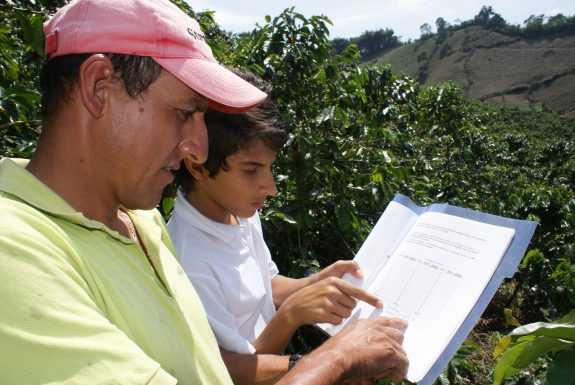BOGOTÁ, Colombia – The Escuela y Café (School and Coffee) program, successfully implemented since 1996 by the Colombian Coffee Growers Federation (FNC) in 6th-to-11th grade rural schools, was chosen today as the winner of the 3rd edition of the Recognition of Good Practices for Sustainable Development, in the non-business category.
This program, recognized by Global Compact Colombia and the Bogotá Chamber of Commerce, within the framework of the Sustainable Development Goals (SDGs), positively impacts Goal 1 “No Poverty” by helping coffee growers incorporate technologies and business models that increase productivity and profitability, and Goal 4 “Quality Education” by providing relevant context knowledge, making the educational system suitable for the economic reality of rural areas.
The program also contributes to SDGs 5 “Gender Equality” and 12 “Responsible Consumption and Production” by promoting gender equity and sustainable production.
Escuela y Café is part of the Escuela Nueva (New School) Rural Education Program, which, in the department of Caldas, has been implemented since 1982 through a public-private partnership coordinated by the Departmental Coffee Growers Committee.
“We feel very proud of this recognition for Escuela y Café. This is one of our rural education strategies to train a number of generations with knowledge and skills, promoting progress for their families and communities,” said the Executive Director of the Caldas Coffee Growers Committee, Marco Tulio Hoyos, who received the award on behalf of Colombian coffee growers and the FNC.
Escuela y Café: Pedagogical innovation with international recognition
Escuela y Café was born as a pedagogical innovation of Escuela Nueva in Caldas and allows children in rural public schools to acquire skills for coffee production and management that is the livelihood of their families and the basis of regional economy and culture.
Teachers are trained to include conceptual, historical and technical aspects of coffee production in different subjects. Education is strengthened with targeted projects (small coffee lots in schools that allow technical production aspects to be explained in a practical way) and supervised projects (coffee crops established on the students’ farms).
In this way, Escuela y Café develops students’ basic skills and entrepreneurial and business attitudes focused on coffee farming with a generational integration approach through permanent interaction between the students and their families; classroom learning is complemented with experience-based knowledge.
This program has been decisive for over 1,000 young entrepreneurial growers to have found in coffee an option to stay in the countryside and generate development with the support of the public-private partnership Education for Competitiveness.
Impact assessment
In 2019, the Regional Center for Coffee and Business Studies (CRECE) assessed the impact of the rural education program in Caldas, with the following results:
- 59.4% of young people take part in management or work done on the family farm. Changes made are mostly better agricultural, administrative and environmental practices.
- The businesses undertaken by graduates account for over 50% of household income and have been an important family employment source. Almost half of these businesses are focused on coffee, with productivity above the national average.
- Even if only 27.2% plan to remain in the family business (possibly due to small size of farms), 71.6% of graduates plan to remain in the coffee industry in higher-value links of the chain (marketing, coffee-based products, cupping, barismo, etc.).
About Global Compact
Global Compact Colombia represents in the country the UN Global Compact, an initiative that promotes commitment of private and public sectors and civil society to aligning their strategies and operations with 10 universally accepted principles in four main areas: human rights, labor standards, environment, and fight against corruption.
Its purpose is also to contribute to achievement of the SDGs.















